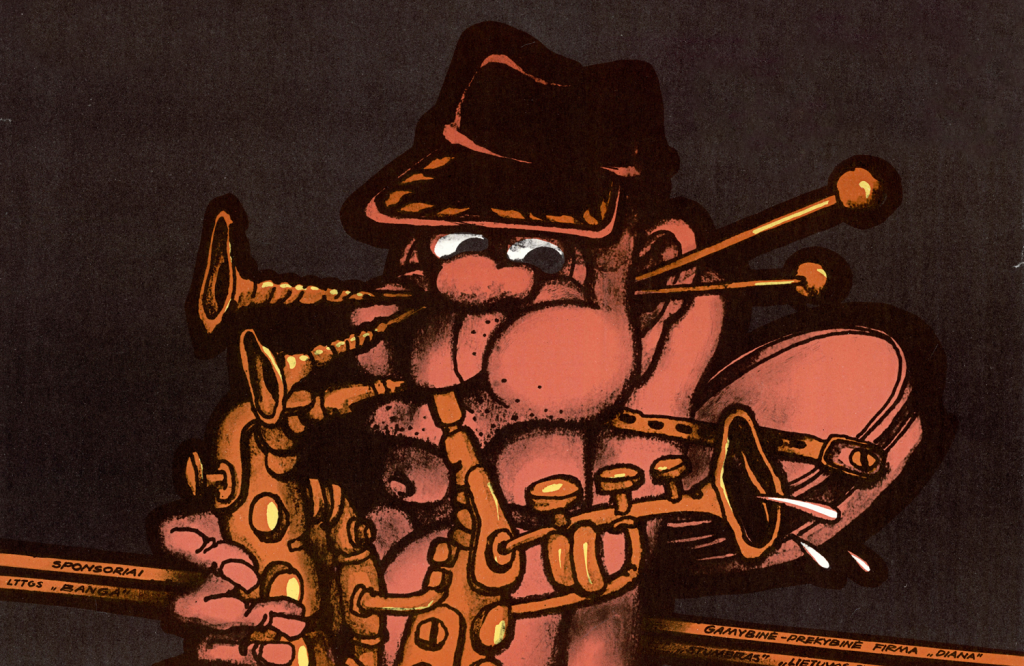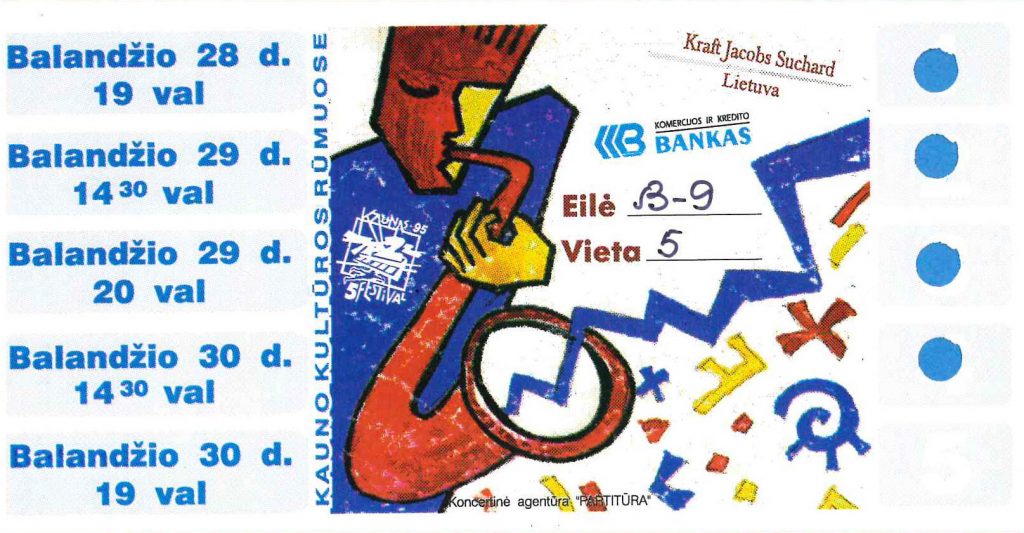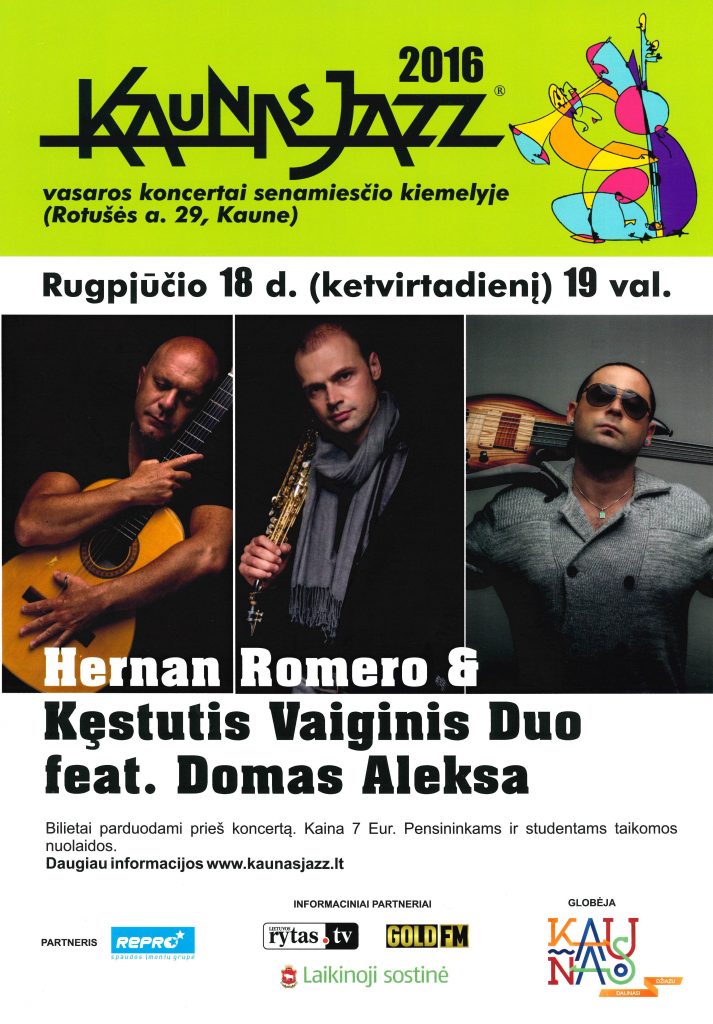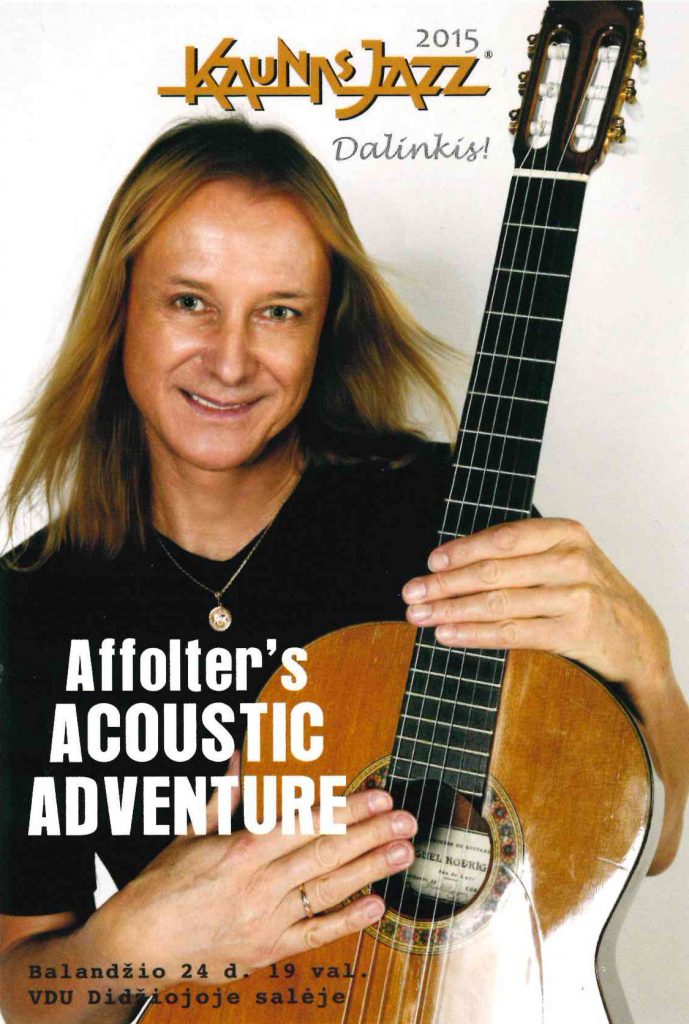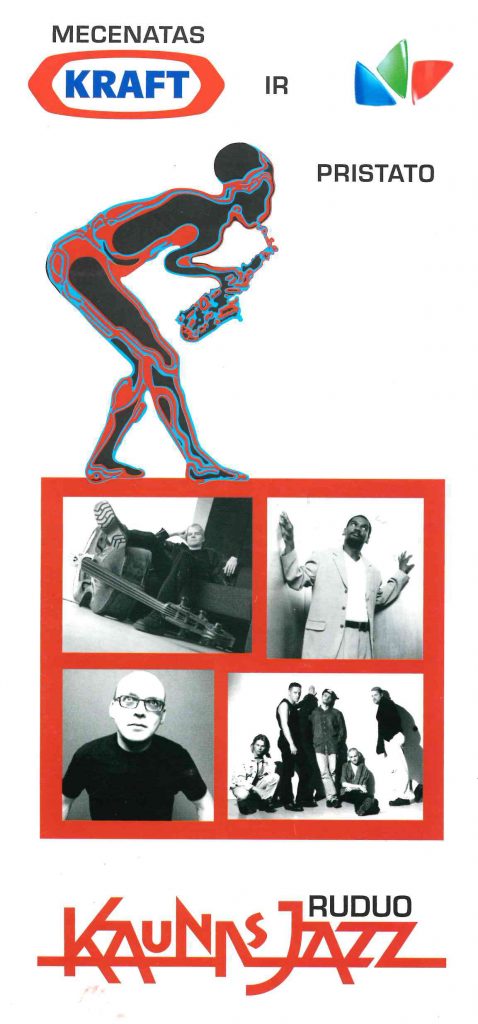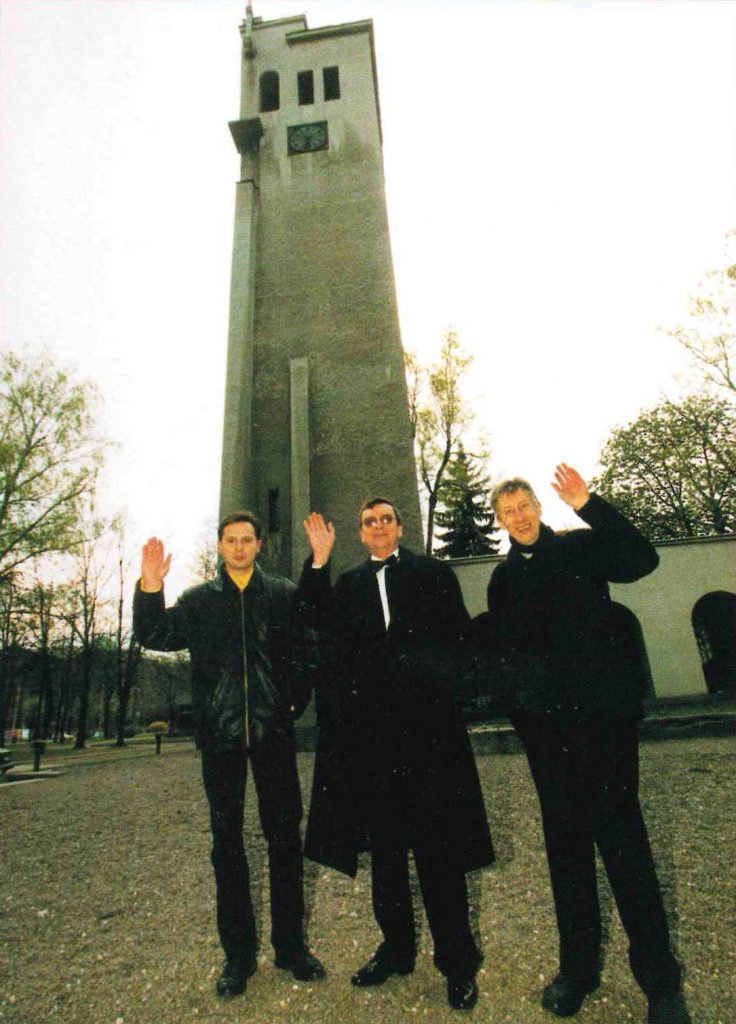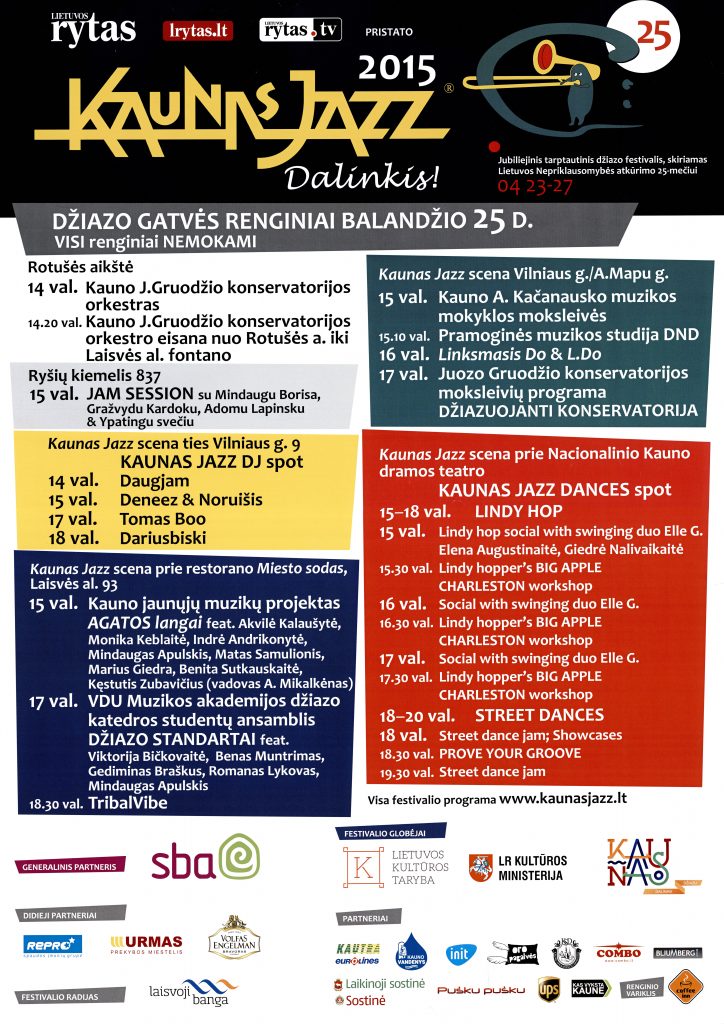During the 30 years of its existence, the International Jazz Festival ‘Kaunas Jazz’ has attained a significant position in the musical life of Lithuania and Europe and has become an integral part of the cultural identity of Kaunas city. Many personalities, who have had a great influence on the development of jazz music in Lithuania, grew up alongside this festival.
Mikas and Kipras Petrauskas’s collection, stored at the Kaunas City Museum, contains nearly 500 exhibits related to the history of this festival, 434 of which were donated by Audra Jučienė, the director of the public institution JJJAZZ.
Museologist Deimantė Kondrotaitė
The origins of Kaunas Jazz?
When the choir conductor Jonas Jučas started working at the Kaunas Philharmonic, his first task was to organize a concert jazz tour across Lithuania. Many musicians performed on this tour, including trumpeter Itaru Oki from Japan, virtuoso bass clarinetist Michel Pilz from Germany, Lithuanian multi-instrumentalist Petras Vyšniauskas, and others. In the year following this successful concert tour, the Kaunas Philharmonic hosted a concert involving several of the best bands that had performed at the Birštonas Jazz Festival. “The event was quite a success. It was then that we had the idea to start something here, in Kaunas,” said J. Jučas, the founder and organizer of the festival. And so, the first international Kaunas Jazz festival took place on April 19-21, 1991.
Challenges faced by the first festivals…
The first festival took place at a very difficult and complicated time. Lithuania’s restored independence had only been recognized internationally by two other states: Iceland and Denmark. Lithuania did not yet have its own convertible currency… And border checkpoints were constantly under attack from the armed forces of the USSR. At that time, everything was scarce, including money, fuel, and other necessities. Even food items were rationed.
DaugiauHowever, this did not prevent a group of enthusiasts from organizing the first jazz fiesta in Kaunas. They were assisted by the music agency Litus (led by A. Gustys) and by Kaunas Philharmonic (led by J. Krėpšta); financial support was provided by Kaunas City Municipality, and the premises by the governing body of Vytautas Magnus University, with contributions from a few other sponsors too.
“There was a shortage of petrol during the second festival… I bought petrol from local “hands” before the festival because you couldn’t get any at the gas station at the time. We poured the petrol into barrels, from barrels into canisters, and from canisters into fuel tanks… We didn’t have anywhere to keep these barrels, so we left them at my aunt’s place, near my colleague’s home. How nothing burnt down there I don’t know… There were no measures of fire safety whatsoever. Four barrels of 93 petrol were standing by a wooden house… Well, but what can you do – such were the times,” recounts J. Jučas.*
Daugiau*A quote from the April 22 (2014) article on the ‘15min.lt’ portal, ‘J. Jučas: Kaunas Jazz gimė šviesių ir gerų žmonių dėka’ (‘J. Jučas: Kaunas Jazz was born thanks to bright and good people’).
It was very difficult for the Kaunas Jazz team to organize the second and the third festivals. In 1991, the cost of the festival was 65,000 roubles; in 1992, it went up to 600,000 roubles, as prices rose by as much as 25 times in a single year; and at the beginning of 1993, the inflation rates were utterly difficult to predict. Each and every week, the US dollar appreciated in value by over ten coupons (coupons were then Lithuania’s temporary currency); therefore, the third Kaunas Jazz Festival was particularly modest. The situation improved in 1994 when Lithuania established its national currency, the litas; new long-term sponsors appeared, and in 1995, after the fifth anniversary of the Kaunas Jazz Festival, “it was the first time that, at the end of the festival, its producer J. Jučas did not utter the traditional phrase: “No more jazz!” – as related in the ‘Kaunas Jazz’ publication (PMMPEK-17496).
The festival that has changed the face/image of the city
During the preparations for the first Kaunas Jazz Festival, the organizers had to contend not only with financial and organizational difficulties, but also with a negative response from the public. Many people ridiculed such lofty ambitions and did not believe in the success of this festival, because the circle of admirers of jazz and symphonic music in Kaunas was very narrow at the time.
DaugiauMeanwhile, the press wrote: “I would have never believed that Kaunas, the homeland of pop music, tracksuits, and joke-telling championships, would organize a jazz festival. When I heard that such an event was going to take place, I wondered if that was the latest Kaunas joke. I arrived feeling quite sceptical, and as I was leaving, I might have given myself a pat on the back: “How wrong you were, brother. This city does have some charm after all! “(Kuzmickaitė, Jūratė. ‘Trim skambiais akordais’ (‘In three loud chords’) // Kauno Tiesa, April 24, 1991).
But they succeeded! This year, the festival is celebrating its 30th anniversary, and thanks to it, Kaunas is now known as a jazz capital.
Lithuanian jazz virtuosos
Lithuanian jazz masters, talented, promising young performers and artistically-polished professional bands, such as Kaunas Big Band, Kaunas State Choir, Kaunas String Quartet, Kaunas Symphony Orchestra, and others, regularly perform on the Kaunas Jazz Festival stage.
Arina Borunova, who has been hailed as the queen of Lithuanian blues, recounts: “Performing on stage with such an orchestra was scary and joyful at the same time. The musical instruments of the Kaunas Big Band have also left their mark in my memory. Back then, everyone would play with whatever they had to hand. During our performance, behind my back, I could hear a harsh sound, an iron rasping; it was very disquieting, but the taste of freedom and music was stronger than anything.”*
*A quote from the March 21 (2015) article in the magazine ‘Žmonės’, ‘Dainininkė Arina – apie pirmąjį savo atlyginimą ir reikalavimus renginių organizatoriams’ (‘Singer Arina on her first pay packet and her rider for event organizers’).
The most prominent Lithuanian saxophonist Petras Vyšniauskas and the most prominent Lithuanian composer Giedrius Kuprevičius are two people without whom the Kaunas Jazz Festival would simply be unimaginable. Although these two highly distinguished Lithuanian musicians have only carried out a couple of projects together, i.e. ‘Bolero’ and ‘PetVySax and GieKuKurz’, even so it would take a separate exhibition to display all of their creative work separately. Incidentally, Vyšniauskas is the only jazz musician who has participated in every single Kaunas Jazz festival.
It is necessary to mention other highly prominent Lithuanian jazz legends, who launched the history of the Kaunas Jazz Festival and brought into being new connections between jazz and academic music.
DaugiauThis list includes Vladimiras Tarasovas, the most renowned Lithuanian drummer and percussion master; Vladimiras Čekasinas, saxophonist, composer, and an exceptional pedagogue; Saulius Šiaučiulis, one of the most prominent traditional jazz pianists in Lithuania; Leonidas Šinkarenko, the acoustic and virtuoso electric bass player; Dainius Pulauskas, masterful pianist, one of the most interesting composers of European fusion jazz; Vytautas Labutis, saxophonist, multi-instrumentalist; Valerijus Ramoška, one of the greatest jazz trumpeters in Lithuania; Arvydas Jofė, one of the most interesting Lithuanian drummers; Skirmantas Sasnauskas, the best-known Lithuanian jazz trombonist; Arūras Anusauskas, one of the most prominent Lithuanian jazz pianists; Neda Malūnavičiūtė, jazz vocalist, flautist; and many other talented musicians whose names are already revered in jazz history textbooks.

Linas Adomaitis – violinist, music performer, composer, producer, radio host. His friendship with the Kaunas Jazz Festival started in 2001, when the performer began his solo career and performed at the festival with his project ‘7 Colours’. “I remember the very first concert in the Vytautas Magnus University hall when the electricity went out. I felt real jazz in that moment because jazz is improvisation, and the audience didn’t disperse. Since then, I have not missed a single festival,”* recalled the musician. In 2016, Linas Adomaitis once again surprised the festival’s audience with a musical experiment which had never previously been heard in Lithuania. This time, he took the stage with the German string quintet ‘G-Strings’, in which Vytautas Sondeckis was playing, and with pianist Egidijus Buožis. It should be mentioned that Buožis is a Lithuanian Guinness Record holder, who has performed the longest spontaneous single-composition jazz recital, which lasted 1 hour 12 minutes.
*A quote from the March 24 (2017) article on the ‘diena.lt’ portal: ‘Kaunas Jazz festivalyje – 26 nemokami koncertai ir 40 tūkst. lankytojų’ (‘Kaunas Jazz Festival sees 26 free concerts and 40,000 visitors’).

The band ‘JazzWay’ has played several times at the Kaunas Jazz festival, and in 2019 it performed in an unusual venue, Kaunas bus station. In Steponas Januška’s words, “performing in such an unusual environment is a challenge”, but “it is interesting to try out new venues for music. I think that’s how we will bring jazz closer to life.” According to the artist, the bus station is a fascinating and exotic location, and the whole band approves of the organizers’ unconventional solution.*
DaugiauThe band was formed in 2006 at the initiative of singer Steponas Januška. The members of the quintet were all graduates, from different cohorts, of the Department of Jazz Music of Klaipėda University and all boast rich musical experience. Their hobby horse is modern compositions of traditional jazz.
*A quote from the April 25 (2019) article on the ‘lrytas.lt’ portal: ‘Festivalis „Kaunas Jazz 2019“ pakvietė į netikėtą erdvę. Koncertas vyko autobusų stotyje’ (‘Kaunas Jazz 2019 Festival invited us to an unexpected space. The concert took place at the bus station’)
The Kaunas Jazz Festival has inspired and educated countless young people, some of whom took their first steps on the stage here. Among them is the emerging jazz drummer, clarinettist, and vocalist Ąžuolas Paulauskas.
DaugiauThis artist made his debut on the Kaunas Jazz stage at the age of six (together with the Kaunas Big Band), and, at the age of just five, entered the Lithuanian Guinness Book of Records as the youngest professional drummer in Lithuania. In 2019, the musician presented an album of new compositions, ‘4’, in which he played as many as four instruments, and was awarded a prize by the festival’s organizers. “It is hard to find the words for describing the feeling when you are being awarded the Kaunas Jazz 2019 Artist of the Year Prize at your concert,” wrote Ą. Paulauskas on his Facebook account.
Kęstutis Vaiginis, Domas Aleksa, Hernan Romero are frequent guests on the stage of the Kaunas Jazz Festival. The friendship between the virtuose saxophonist K. Vaiginis and the Grammy award-winner, flamenco guitarist from Argentina, H. Romero, along with their longest-lasting musical project together, have developed over seventeen years. One of the most talented bassists and jazz composers of the young generation, D. Aleksa, has joined this duo for a handful of joint projects.
“The Kaunas Jazz Festival has been very significant for my musical career. I love it very much. It was at this festival that I took my first steps towards the international arena. As early as during my studies, I appeared on the Kaunas Jazz stage for the first time with a project led by the Lithuanian jazz star, saxophonist Vytautas Labutis. After this performance, Jonas Jučas invited me to play with celebrities such as Barbara Dennerlein and Daniel Messina. It meant a lot to me. During my student years, I would come to Kaunas to play in numerous Kaunas Jazz jam sessions with world-class stars, who came to the festival and created incredible jazz improvisations in the evenings at the legendary ‘Combo’ club. Kaunas Jazz was a great environment to grow up in, I listened to many good concerts by those performers who were idols in my life,”* recounted K. Vaiginis.
*A quote from the March 22 (2019) article published on the website of the Lithuanian Musicians’ Union, ‘Kaunas Jazz 2019 programa jau ir vėl stebins’ (‘The Kaunas Jazz 2019 programme will surprise you yet again’)
The band ‘Saulės kliošas’ deserves a special mention, because they have been playing on the Kaunas Jazz stage since 2001. Their performance has already become an integral part of the festival. According to the festival’s organizers, when ‘Saulės kliošas’ are in the “groove”, stopping them becomes very tricky, as we have, on multiple occasions, witnessed it ourselves when we had to almost drag the band away from the stage, after they had exceeded the time allowed by the city’s noise regulations and the hyped-up crowd was chanting “One more time!”*
DaugiauThe band was founded in 2000 and became the pioneers of funk, a distinctive style of music, in Lithuania. They now play funk, R&B, and soul music. The band has released two albums: ‘Stubidubap’ (2004) and ‘Energy’ (2012).
*Information from the report published on the website of the Kaunas Cinema Centre ‘Romuva’.

World-class jazz stars
Every year, the biggest jazz stars as well as many not-yet-famous but extremely talented jazz music gems, unheard of even to the biggest jazz enthusiasts, from all over the world, perform on the Kaunas Jazz stage. Presenting all of them would require a separate solid monograph to be written. Most importantly, almost all the musicians that Jonas Jučas had dreamt of seeing perform, when he started the Kaunas Jazz Festival, have already performed on the festival’s stage.
It is mandatory to mention the Swiss Heinz Affolter, who at the first Kaunas Jazz Festival simply captivated the audience, and the jazz-ing audience captivated him… As composer Algirdas Klova writes, “This was just a miracle back then. The sound quality was memorable, we hadn’t heard anything like it before, as well as the naturalness of his music, a very conscientious approach to creativity and to music in general. After that he really developed a liking for Lithuania and cold beetroot soup…” (Klova, Algirdas. ‘Daug ar mažai’ (‘A Lot or a Little’) // 7 Meno dienos, May 8, 2015).
DaugiauThe artist has visited Lithuania many more times since then, and recorded three albums here. Full of admiration for this country, he wrote the song ‘Lietuva’ and filmed a music clip in Nida, waving the Lithuanian flag.

The festival has seen performances by such bands and performers as: the Eurovision winner Salvador Sorbal; one of the most prominent rhythm & blues vocalists Laura Mvula; jazz veteran and pianist Bob James; the owner of the most powerful voice, who has sung in the White House, Dianne Reeves; the best Polish jazz pianist Włodek Pawlik; jazz and television star Till Brönner; virtuoso vocalists whose voices themselves serve as instruments, ‘Naturally 7’; the world’s best jazz vocalist Cassandra Wilson; the band with 12 Grammy nominations ‘Spyro Gyra’; the 14-year-old child prodigy, pianist Gadi Lehavi; the world’s best bassist, whose biography recalls an encyclopaedia, Ron Carter; the guitar genius Al Di Meola; poly-instrumentalist, vocalist, and composer Richard Bona; the world’s most famous jazz organist Barbara Dennerlein; one of the best vocal groups in the world, ‘Take 6’, and many other performers, all of whom you can read about on the website of the Kaunas Jazz Festival.
It is also necessary to mention the jazz superstar Gregory Porter and the world’s best jazz vocalist Bobby Mcferrin. As it happens, they are the most expensive musicians to have performed on the Kaunas Jazz stage.
The artistic director of the festival, Indrė Jučaitė, “always guesses correctly which jazz names are rising and will soon be riding on a wave of popularity. She even manages to guess who will win the Grammy (affirms Jučas, smiling). Gregory Porter is coming to the festival this year, having just been awarded a Grammy for his record from last year; the same happened with Dianne Reeves. Our contracts with these artists had been signed prior to that. This is quite important, because the awarding of these statuettes marks a turning point in the fight for famous musicians: if you had signed a contract with them before, you pay the old price, but when a musician receives a Grammy, of course, their price increases significantly,”* – says Jonas Jučas in one of his interviews.
Daugiau*A quote from the April 24 (2017) article on the ‘sekunde.lt’ portal ‘Jonas Jučas džiazo festivalyje dirba gaisrininku’ (‘At the jazz festival, Jonas Jučas works as a firefighter’)
Traditions of the Festival
“The festival is a living organism, just like a tree. If one idea fails, a new twig grows in place of that withered branch. One should not be afraid to give up ideas that have not worked out or do not correspond to the present,” says Jonas Jučas. It is no surprise, therefore, that every few years the festival is complemented by a new idea that turns into a beautiful tradition over time.
DaugiauInitially, the Kaunas Jazz Festival used to take place only once a year, in April. In December 2002, the Concert of the Year was held for the first time, where one of the world’s most masterful vocal groups, ‘Take 6’, performed. October 2003 saw the inauguration of the concert cycle ‘Kaunas Jazz Autumn’. That year, listeners heard bassist Victor Bailey, the popular Icelandic band ‘Mezzoforte’, and an impressive international project by double bassist Lars Danielsson from Sweden, pianist Bugge Wesseltoft from Norway, and the Lithuanian cellist Vytautas Sondeckis, who not only played, but also conducted the soloists who were helping the Lithuanian Chamber Orchestra.
Some of the festival’s traditions are unique and characteristic only to Kaunas Jazz. One of them is the carillon music concert, which has already become trademark of the festival. In 1992, carillonists Julius Vilnonis and Raimundas Eimontas held the first free concert ‘Carillon Jazz’ in the garden of the Military Museum, which featured jazz standards and original improvisations.
DaugiauIn 1995, the reigns were taken up by composer and carillon player Giedrius Kuprevičius. His piece ‘Chalk and Copper’ (which the author performed together with trumpet player Valerij Ramoška) inspired another heart-warming tradition – the children’s drawing event ‘Kaunas Jazz on the Pavement’. Having initiated this event, Irena Mikuličiūtė, who is the head of the children’s art studio and art gallery and an artist herself, has been its curator since 1999.

In 1993, the first concert of sacred jazz was held in the St. Michael the Archangel’s Church, or the Garrison Church. Music of the project by the composer and pianist Tomas Kutavičius and virtuoso saxophonist Petras Vyšniauskas, which was highly praised by musicologists, was played under the arcs of the house of prayer.
In 2001, a new section, ‘Jewish Theme in Jazz’, was added to the list of the festival’s traditions. That year, the ‘New Art Visions’ project by the Lithuanian percussionist, avant-garde jazz performer and this project’s founder Arkadijus Gotesmanas and the composer and pianist Tomas Kutavičius, was performed in Kaunas Synagogue. These concerts in the synagogue were so popular that not only seats but also standing tickets sold out quickly.
The organizers of the festival are always on the lookout for unusual venues and new forms of artistic expression. The search for a fusion of music, dance, and visual art has created several new traditions at the festival. In 1993, the first exhibition of photographic works was organized, in which the works of Dainius Labutis, Evaldas Butkevičius, and E. Petrauskas were exhibited. In 1998, the first master class took place. In 1999, Jazz Fashion was launched; and 2014 saw the launch of the ‘Jazz Streets’ project, which in the following year also included jazz dance.
DaugiauThese non-standard projects provide an opportunity and space for young, talented artists to freely express themselves and their ideas, gain stage experience and get noticed.
In 2002, the festival was complemented by another fun tradition – the Jazz Eaters’ Award. During the Kaunas Jazz festivals, Kaunas becomes the capital of music, while its residents seemingly feed on jazz. That is why we decided to call our award the ‘Jazz Eaters’ Award’,”* explains Vilmantas Šimoniūtis, the manager of the restaurant chain Pizza Jazz.
DaugiauThe festival runs a public’s choice award for the best performer. This award has previously gone to Richard Bona, Barbara Dennerlein, Al McKay, Nils Landgren, Arturo Sandoval, the band ‘Incognito’, performer Leny Andrade with the band ‘Banda Sambop’, and accordionist Chico Chago.
*A quote from the April 18 (2002) article on the ‘delfi.lt’ portal ‘Publikos išrinktai grupei – “Jazz Eaters Award”‘ (‘Jazz Eaters Award goes to the band chosen by the public’)
Every year since 1994, the festival’s organizers commission the making of documentaries, which capture the festival’s most remarkable moments, along with the thoughts of the participating stars about Kaunas, jazz, and their own creative work. Films about the Kaunas Jazz Festival have been made by Rytis Zemkauskas, Donatas Savickas, Domas Burkauskas, Gintaras Gudonis, Ričardas Rickevičius, Remigijus Ruokis, and others. Director Eglė Baltrėnienė says, “Every year, when filming the festival, we try to capture the mood of the festival lingering in the air, so that the film would not only serve as a collection of documented images, but would also enable us to feel that wonderful state again and again. And Kaunas, believe me, really knows what it means to “live in the rhythm of jazz.”*
*A quote from the April 26 (2018) article on the ‘lrytas.lt’ portal ‘Kaunas Jazz šiemet kviečia džiazuoti kitaip’ (‘Kaunas Jazz proposes playing jazz differently this year’)
